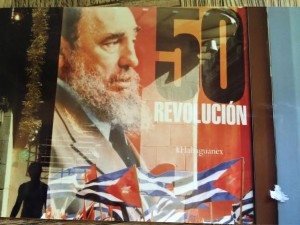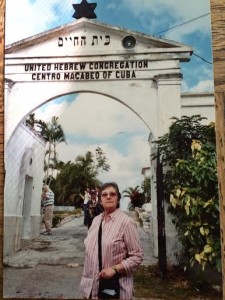
Ancient cars rolled down the few newly paved streets. Sparking restaurants awaited a sudden rush of curious American tourists in Old Havana’s center, while the rest of the city was stuck in the 1950s. Anti-Bush graffiti and portraits of Fidel Castro papered the walls as did signs about the imminent New Year’s Day celebration for the 50th anniversary of the revolution. It was 2009 and it was the first time I had seen Cuba since my family left in 1962.
My mother, my sister and I joined a week-long Jewish humanitarian mission. Having discussed this idea with trepidation for years, we filled out reams of paperwork, paid large visa fees, and finally, after a flight to Florida and an hour long flight from Florida’s airport, we entered the island we once called home.
Since the primary purpose of our visit was humanitarian We brought extra suitcases stuffed with basic goods: pens, batteries, underwear, along with menorahs, candles, dreidels and chocolates to help the community celebrate Chanukah. Throughout the flight, as we sailed over crystal blue water, I kept on pinching myself to make sure it was real.
Our first stop was El Patronato, the Jewish community center in Havana, to donate the desperately needed medications to restock its free pharmacy. The tunes in the synagogue on Friday night were the same tunes we sang at our own shuls in Brooklyn and the Five Towns. We visited the two other Havana synagogues, the Orthodox Adath Israel, where we met the only kosher butcher in Cuba, and the Sephardic shul. We viewed old gravestones at the Jewish cemetery in Guanabacoa. We saw the “kosher style” Jewish-themed hotel Raquel, but no kosher food was available for visitors.

We visited my paternal uncle and aunt in a neglected section of Havana. My uncle was part of the ten percent of Jews that remained when Fidel came to power in 1962. I wrote about the mystery of why he stayed in Cuba for Tablet Magazine in 2013 in an article entitled “My Man in Havana.” My uncle and his wife graciously served us an abundant meal in their spotless home, with foodstuffs accumulated through rations, from the dollars market and from donations from the Jewish community center, even including an unexpected bottle of kosher wine. That trip was simultaneously magical and sobering as we visited a community that was poor in materialism but rich in spirit.
Last November, I tried to go back again but due to the political troubles between the US and Cuba, it did not pan out. This year, President Obama’s changes to the status quo began in earnest. Now it is again possible for Americans on people-to-people missions and Cuban-born visitors to travel the 90 miles from the US to Havana. Even Jetblue is operating charter flights.
In the short-run the formalization of ties may have an adverse effect on the Jewish community according to June Safran, the former president and executive director of Cuba-America Jewish Mission. She believes that the opening of relations mean less people will need humanitarian visas to enter the country.
“Fewer missions means fewer people carrying things because they think the country is open now and doesn’t need anything,” she said. “Non-mission trips usually don’t ask people to bring things to the Jewish community. ”
At the same time, June added, more Jewish Americans visiting Cuba means more contact between the Cuban and American Jewish populations. “Many are benefiting from the increased contact with Americans who are generous when they travel. Remember, most of the Jewish community speaks English so communication is quite good. For the Cuban Jews both here and in Cuba, it is a big improvement to be able to travel to visit relatives in both directions. Families are happier and life is easier on both sides of the sea.”
Kosher tours are already in the works. (Editor’s Note: Rabbi Steven Weil, senior managing director of the Orthodox Union will be leading a trip at the end of October—though it’s almost sold out. Email Nancy Markovitch at markovitchn@ou.org for information.)
Hersh Taubenfeld, of Havanagila Cuba Tours and Lasko Kosher Getaways, described it as a “seminal time,” “There are very exciting opportunities for Kosher travel to Cuba,” he said, adding that his own interest in the island stemmed from family ties in Cuba. “I knew that with some important partners we could make kosher travel to Cuba possible.”
“It has been a difficult process because of the economic and political restraints,” he said. “However, recent developments are starting to change that. My partners and I have plans to make kosher food readily available on the island and hope to launch the first Jewish Glatt kosher mission to Cuba within the next year.”
Miriam Saul, co-founder of Other Cuban Journeys who led my tour, said that there is a great deal of uncertainty about the future. “For now there is a tremendous amount of people traveling to Cuba and now not only for religious reasons. So the Jewish communities are visited but not always by groups who are in Cuba to support and give tzedakah to the communities.”
Jim Taubenfeld, former president of the Jewish Community Center of Puerto Rico, thinks the new relationship between the US and Cuba will affect the Jewish community in the same way that it impacts the rest of the Cuban population. “The relations change is a small step forward with nominal immediate benefit to the Cuban people, but the noticeable difference will come when we are able to do business in Cuba,” he said.
My Cuban-born-and-raised parents Pola and Juan Bradman agree: whatever benefits the cubans get from these new developments will naturally reach the remaining Jews on the island and life will get better.
There are additional issues in securing kosher food for visitors and the Cuban Jewish community, according to Ben Greszes of Other Cuban Journeys.
“Until the embargo is lifted, shipping kosher food to Cuba from the USA is still prohibited,” he explained. “We have been sending kosher food from Canada, Mexico and Panama on a limited and difficult basis. The Cuban Government is very strict about new foods coming into the island.
“At the same time, very few foods from South America and Mexico have an OU on them and that makes it difficult for an American mashgiach to certify it. Today, a mashgiach needs a special religious visa that has to be approved by the Cuban Jewish community. We are continuing to work hard to make kosher food a staple in Cuba. We have done a lot of research, broken down a lot of fences, made many friends in the Jewish community and are close to making it a reality.”
If easy kosher travel to Cuba becomes a reality, it will bring many more Jewish visitors to my beautiful island that is so close yet so far. When I return, it will be bittersweet. The uncle I hardly knew passed away in 2011. While he was intermarried, I wrote in Tablet, that “he hadn’t left his identity behind completely. In his final days, suffering from terminal cancer, he asked to be buried in Havana’s Jewish cemetery.” I am heartened by the thought of one day celebrating Pesach in Havana—that would truly feel like a holiday celebrating freedom.
The words of this author reflect his/her own opinions and do not necessarily represent the official position of the Orthodox Union.



